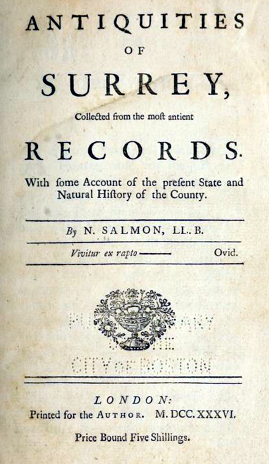Nathanael Salmon on:
[Wikipedia]
[Google]
[Amazon]
 Nathanael (or Nathaniel) Salmon (22 March 1675 – 2 April 1742) was an English antiquary who wrote books on Roman and other antiquities to be found in the south-east of England. He was not well respected as a scholar in his time or subsequently, but he was industrious and well travelled, and he recorded many local customs and much folklore.
Nathanael (or Nathaniel) Salmon (22 March 1675 – 2 April 1742) was an English antiquary who wrote books on Roman and other antiquities to be found in the south-east of England. He was not well respected as a scholar in his time or subsequently, but he was industrious and well travelled, and he recorded many local customs and much folklore.
A New Survey of England, wherein the Defects of Camden are supplied &c
', 11 parts, 1728–1729. *
The Lives of the English Bishops from the Restauration to the Revolution
', 1731–1733. *
Antiquities of Surrey, collected from the most ancient records
', London, 1736. *''The History and Antiquities of Essex'', 1740.
 Nathanael (or Nathaniel) Salmon (22 March 1675 – 2 April 1742) was an English antiquary who wrote books on Roman and other antiquities to be found in the south-east of England. He was not well respected as a scholar in his time or subsequently, but he was industrious and well travelled, and he recorded many local customs and much folklore.
Nathanael (or Nathaniel) Salmon (22 March 1675 – 2 April 1742) was an English antiquary who wrote books on Roman and other antiquities to be found in the south-east of England. He was not well respected as a scholar in his time or subsequently, but he was industrious and well travelled, and he recorded many local customs and much folklore.
Early life
Nathanael Salmon was born on 22 March 1675 atMeppershall
Meppershall is a hilltop village in Bedfordshire near Shefford, Bedfordshire, Shefford, Campton, Bedfordshire, Campton, Shillington, Bedfordshire, Shillington, Stondon and surrounded by farmland. The village and the manor house are mentioned in t ...
Rectory, Bedfordshire
Bedfordshire (; abbreviated Beds) is a ceremonial county in the East of England. The county has been administered by three unitary authorities, Borough of Bedford, Central Bedfordshire and Borough of Luton, since Bedfordshire County Council ...
, the eldest son of Thomas Salmon, the Rector, and his wife Katherine Bradshaw. He was educated at Corpus Christi College, Cambridge (LLB, 1695).
Career
Salmon was ordained a priest in 1699, but refused to swear allegiance to Queen Anne in 1702 and thereby reject the son of King James II. He resigned as a curate and worked for a time as aphysician
A physician (American English), medical practitioner (Commonwealth English), medical doctor, or simply doctor, is a health professional who practices medicine, which is concerned with promoting, maintaining or restoring health through th ...
. He rejected the offer of a parish in Suffolk, although it paid a stipend
A stipend is a regular fixed sum of money paid for services or to defray expenses, such as for scholarship, internship, or apprenticeship. It is often distinct from an income or a salary because it does not necessarily represent payment for work p ...
of £140 a year.
Salmon wrote a number of books on local history, collecting folklore and detailing local customs, and he "could turn a pungent phrase." He travelled extensively in England, carefully observing landscape and recording what he was told of the folklore, as well as current life and conditions. His histories are considered inaccurate, but he usefully published much manuscript material.
Death
Salmon died in London on 2 April 1742, leaving three daughters. He was buried at St Dunstan in the West, London 5 April 1742.Works
*''The History of Hertfordshire, describing the county and its ancient monuments, particularly the Roman'', Richardson, London, 1728. *A New Survey of England, wherein the Defects of Camden are supplied &c
', 11 parts, 1728–1729. *
The Lives of the English Bishops from the Restauration to the Revolution
', 1731–1733. *
Antiquities of Surrey, collected from the most ancient records
', London, 1736. *''The History and Antiquities of Essex'', 1740.
See also
*Henry Chauncy
Sir Henry Chauncy (12 April 1632 – April 1719) was an English lawyer, topographer and antiquarian. He is best known for his county history of Hertfordshire, published in 1700.
Life
He was born in Ardeley (then known as Yardley), Hertfordshi ...
References
Further reading
* 1675 births 1742 deaths English antiquarians 18th-century English historians 18th-century English medical doctors People from Central Bedfordshire District Alumni of Corpus Christi College, Cambridge English local historians Historians of Christianity Folklorists History of Surrey History of Essex History of Hertfordshire 18th-century English clergy 18th-century English male writers British historians of religion {{UK-cultural-anthropologist-stub